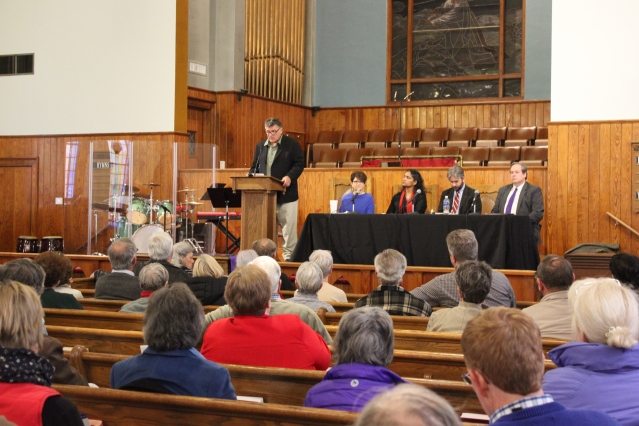By Amanda Richey, Editor-in-Chief
The sanctuary at Triune Mercy Center hosted two unlikely discussions March 14 and 15. Furman faculty spoke about American democracy from both historic and international perspectives followed by lively questions from audience members. These discussions are the first part of a larger faculty-led initiative called “Our Republic...For Which It Stands.”
Twenty-four Furman professors from eight academic departments will participate in the three-part conference series discussing how their disciplines relate to current events in American politics. Faculty organizers hope that the series will elevate contemporary discussion through a non-partisan, scholarly approach while reaffirming the university’s commitment to public engagement.
“Our country is heading down the path of de-democratization. As professors we should have a role in [preventing] this,” said Dr. Akan Malici, professor of politics and international affairs and the primary faculty organizer.
This is one the most extensive public outreach campaigns initiated by faculty in recent years, according to Malici. The series was intentionally designed as “an enthusiastic invitation to the community,” not just a Cultural Life Program series.
“We’ve reached a point where the public desires to hear from their university in town,” Malici said. “Not only should [the faculty] have something to say, but we should lead these conversations, rather than irresponsible pundits on television.”
The discussion on March 14 analyzed immigration and citizenship issues in light of American history. Lloyd Benson discussed suffrage restriction in the Reconstruction-era South and how it affected voting rights in the 1960’s. Lane Harris spoke about the Chinese Exclusion Act of 1882 and its effect on subsequent American immigration laws. Savita Nair shared the story of Bhagat Singh Thind, an Indian immigrant who tried to become a naturalized American citizen for more than a decade, and analyzed his story in the context of citizenship. Finally, Diane Vecchio discussed quota laws and their effect on Eastern European Jewish immigration in the lead-up to World War II.
Questions after the panel spoke ranged from topics of illegal immigration, vetting procedures for refugees or asylum seekers and communicating with fellow citizens in a “fake news world.”

The one complaint faculty had about the first conference was the lack of students present at the panel discussions.
It would have been better with students mingling with community members to grapple with the issues raised by the faculty panelists, Malici said. He believes that future on-campus events with CLP credit-attached will attract students to the panel discussions.
Junior Lucy Lansing attended the panel on March 15 about international politics with a few friends.
“I wanted to see my professors in action sharing their expertise with the community,” Lansing said via email. “Discussion aids in understanding, which can breed tolerance. Our professors discussed immigration issues during the panel event, and I would like to think that for hearing perspectives different from their own, some attendees shifted their views.”
Lansing plans to attend the upcoming panel discussions as well. She enjoyed hearing the questions from community members and “seeing professors loving what they do and sharing their passions.”
Inspiration for the series arose from a meeting of concerned professors shortly after the election in the fall. The meeting was open to all members of the Furman faculty.
Another event sparked by that initial meeting of concerned professors includes the “Facts, Truth, Ethics” day where professors discussed current events as they relate to their fields. Malici said the organizers’ vision is to continue events, hopefully by extending the conference series into the upcoming fall 2017 semester.
The series continues with the second conference “Morality and Ethics in Times of Uncertainty,” featuring faculty from the religion, philosophy and English departments, March 26 at 3:00 p.m. at Greenville First Baptist Church and March 30 at 7:30 p.m. in Furman Hall 214. The series will conclude with a conference entitled “Understanding the Value of Science in an Uncertain World,” featuring faculty from psychology, biology and the earth and environmental sciences departments in April a few weeks before final exams.